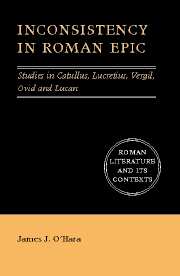Book contents
- Frontmatter
- Contents
- Acknowledgments
- Introduction
- 1 Greek versions
- 2 Catullus 64: Variants and the virtues of heroes
- 3 Death, inconsistency, and the Epicurean poet
- 4 Voices, variants, and inconsistency in the Aeneid
- 5 Inconsistency and authority in Ovid's Metamorphoses
- 6 Postscript: Lucan's Bellum Civile and the inconsistent Roman epic
- Bibliography
- Index of passages discussed
- General index
2 - Catullus 64: Variants and the virtues of heroes
Published online by Cambridge University Press: 12 January 2010
- Frontmatter
- Contents
- Acknowledgments
- Introduction
- 1 Greek versions
- 2 Catullus 64: Variants and the virtues of heroes
- 3 Death, inconsistency, and the Epicurean poet
- 4 Voices, variants, and inconsistency in the Aeneid
- 5 Inconsistency and authority in Ovid's Metamorphoses
- 6 Postscript: Lucan's Bellum Civile and the inconsistent Roman epic
- Bibliography
- Index of passages discussed
- General index
Summary
Theseus knew he owed his life and his country's freedom to Ariadne's courage, and he knew he could not leave without her. Some say he asked Minos for her hand in marriage, and that the king gladly consented. Others say she stole onto the departing ship at the last minute without her father's knowledge. Either way, the two lovers were together when the anchor lifted and the dark ship sailed away from Crete. But this happy ending is mixed with tragedy, as stories sometimes are. For the Cretan captain of the vessel did not know he was to hoist white sails if Theseus came home in triumph, and King Aegeus … spied the black sails coming over the horizon. His heart broke at once, and he fell from the towering cliff into the sea, which is now called the Aegean.
William Bennett, The Book of Virtuesquis ille? “who is that speaking?”
Apuleius, The Golden Ass, 1.1Catullus 64, the epyllion or miniature epic often called the Peleus and Thetis, is not really an epic, but some definitions of epic would exclude four of the five works examined in this study; we must appreciate, rather than lament, the fact that most Roman epics were not written by authors who spent their whole careers working in the genre. Doubtless this fact helped make generic experimentation almost the norm for Roman epic.
- Type
- Chapter
- Information
- Inconsistency in Roman EpicStudies in Catullus, Lucretius, Vergil, Ovid and Lucan, pp. 33 - 54Publisher: Cambridge University PressPrint publication year: 2007
- 1
- Cited by



